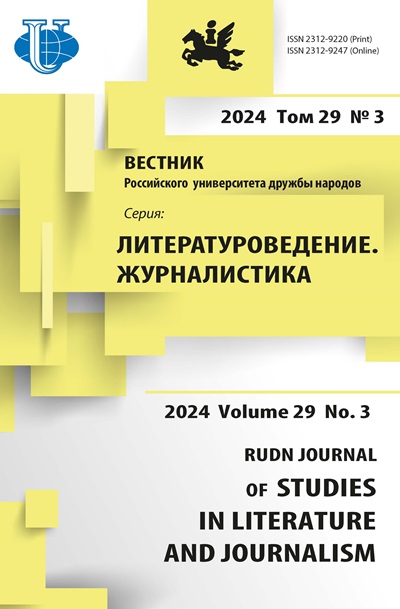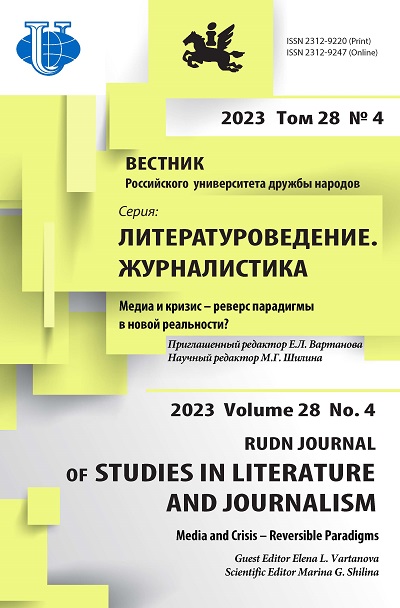Media of the future and future conflicts: what changes to expect with the development of AI technologies: an interview with Professor Ketan Kotecha
- Authors: Bulgarova B.A.1, Kotecha K.2,3
-
Affiliations:
- RUDN University
- Symbiosis Institute of Technology
- Symbiosis International (Deemed University)
- Issue: Vol 28, No 4 (2023): Media and Crisis – Reversible Paradigms
- Pages: 842-844
- Section: INTERVIEW
- URL: https://journals.rudn.ru/literary-criticism/article/view/38106
- DOI: https://doi.org/10.22363/2312-9220-2023-28-4-842-844
- EDN: https://elibrary.ru/BGNVWT
Cite item
Full Text
Abstract
-
Full Text
Artificial intelligence technologies have long gone beyond specific and pinpointed applications. AI is being widely and actively implemented in all spheres of society, including education. The media sphere is no exception: neural networks are being introduced everywhere, and AI technologies are being used to generate and verify texts. In this interview, we will try to understand how much the trajectory of media education will be changed and how the development of AI technologies will affect the journalistic profession.
– Professor Ketan, how do you see the future of AI in education, and in particular the use of AI in the media sphere?
– I think the future of education, and media education in particular, will be enhanced by the introduction of artificial intelligence technologies.
– Do you think that journalists with a classical education without knowledge of AI technologies will remain competitive or will they have to apply new skills?
– I believe that a basic classical education for a journalist will remain a priority. However, special skills will be required to work with the many tools created by artificial intelligence that will be used to create content, as well as to analyse content and translate content into any language. Of course, having such competences will be a huge priority in the professional media sphere. I would say that media won't die without AI, but those who use standard media skills along with AI technology will definitely dominate those who don't use AI.
– What do you think aspiring journalism students should learn?
– I believe that the field of journalism needs to implement AI and have an introductory course on AI that is kind of an applied course in their particular discipline. This will help make the work more efficient and broaden professional horizons.
– Media education of the future – what is it?
– It's a kind of “innovation strategy” and tools using AI technologies. Large number of social media will be analysed for finding the people sentiments and emotions for a particular item in a particular region and that decides the future strategies for the politicians or governors for acting and also it helps them in winning the emotions and sentiment of the people.
– What are the most promising areas of application of AI technologies in the media sphere?
– This will apply to all forms of informational content. Huge amount of information which is generated media will be analysed automatically by AI for a complete conclusion.
– How do you see the future of media text?
– AI technologies are already being actively introduced into the media text, mainly for verification of different levels. The translation from text to voice won’t be synthetic in future because of artificial intelligence is going to have a very human friendly voice with emotions very soon.
– Will the trajectory of media research change in your opinion?
– No doubt about it. There is already a lot of work and it will be enhance further for the fake news detection. That will be the most prominent application of media whereby you search something and the website will tell this information credibility this.
– How can we deal with the detection of false information and fakes with the power of AI?
– The analysis will be more in-depth. Artificial intelligence will check the honesty and buyers in the article available in the media or even in the news that is available in the media and assess the credibility of the article in terms of bias or unbiasedness.
– What do you think the new media will be like in the future and how will people receive information?
– In future people will receive the information which is curated by AI and for example for a one particular particular topic. If there are large number of content created by different countries or different media, an algorithm will take into out all of them and present the summary to the end user. So promising areas will be summary of the contained fake nude detection, social media analysis and generating new information as well.
Interviewed by Bella A. Bulgarova / Интервью провела Б.А. Булгарова
About the authors
Bella A. Bulgarova
RUDN University
Author for correspondence.
Email: bulgarova-ba@rudn.ru
ORCID iD: 0000-0001-6005-2505
PhD in Philology, Associate Professor
Ketan Kotecha
Symbiosis Institute of Technology; Symbiosis International (Deemed University)
Email: bulgarova-ba@rudn.ru
Professor of Computer Science & Engineering, Head of the Symbiosis Centre for Applied Artificial Intelligence (SCAAI), Director of the Symbiosis Institute of Technology, Dean of the Faculty of Engineering, Symbiosis International (Deemed University).
References
















